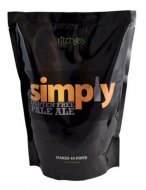Sign up to the Brew Mart newsletter for the latest news, offers & more

Gluten Free Beer Brewing Kits
Gluten free homebrew is an ale made from ingredients which do not contain gluten. The ingredients which contain gluten are rice, millet, buckwheat sorghum, or corn (maize
Gluten Free Homebrew is especially developed with Celiac suffeers in mind.
The sufferers who have gluten intolerance (including celiac disease and dermatitis herpetiformis sufferers) react to specific proteins found in the grains commonly used to brew beer such as barley and wheat.
The hordein which is present in barley and the gliadin present in wheat are types of gluten which can trigger symptoms in people who suffer from these diseases.
People on a gluten-free diet should drink gluten-free beer
Formulas for home brewing gluten-free beer are now available.
The formula includes a sweet sorghum syrup as the principal carbohydrate.
The formula is manufactured commercially from sorghum grain to use as a malt substitute, and it contains amino acids, plus unfermentable sugars needed for yeast nutrition and "mouth feel". Alternative sugars can be added for character and "feel", such as honey and maltodextrin, and roasted or malted buckwheat.
Gluten-Free home brewing beer is now easy with commercially available gluten-free home beer brewing kits which contain the sorghum syrup, hops, yeast and other items. The cost of the beer brewing kits, while more expensive than standard homebrew kits, still produce extremely drinkable GF beer for less than the price of a commercial beer.
Many people find the taste of GF beers to be lacking something.
By adding additional hops, the flavour improves significantly.
All-Grain Brewing
All-grain brewing is the traditional method of homebrewing. In all-grain brewing, you start by mashing crushed Malts to extract the sugars that will be fermented into alcohol. Gluten-free all-grain brewing requires gluten-free grains, such as sorghum, millet, rice, and quinoa. These grains are naturally gluten-free and provide the necessary sugars for fermentation.
Extract Brewing
Extract brewing is a more simplified method of homebrewing that uses pre-malted extract, which is essentially a concentrated wort (the sweet liquid that results from mashing grains). Extract brewing is a good option for beginners or those who don't want to deal with the complexities of all-grain brewing.
Gluten-Free Enzymes
If you're using gluten-free grains, there's a chance that some residual gluten will be present in your wort. You can use a gluten-removing enzyme called Brewers Clarex or Clarityferm to remove this gluten. These enzymes break down gluten proteins into smaller, non-glutenous peptides.
Gluten-Free Yeast
It's essential to use a gluten-free yeast strain for your gluten-free homebrew. A few different gluten-free yeast strains are available, such as Safale US-05 and Wyeast 1056.
Tips for Gluten-Free Homebrewing
- Cleanliness is essential: Make sure to sanitize all your equipment thoroughly to prevent contamination from gluten-containing grains or other sources.
- Use a good quality wort chiller: This will help cool your wort quickly, which can help prevent the formation of gluten proteins.
- Monitor your fermentation: Keep an eye on your fermentation temperature and ensure it stays within the proper range for your yeast strain.
- Sample regularly: Taste your homebrew regularly to check for sweetness and bitterness.
With some planning and care, you can brew delicious, gluten-free homebrew that everyone can enjoy.
Not sure where to start check out these articles?















